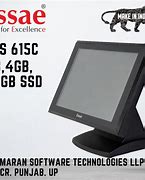In the bustling heart of Mumbai, Amit Desai ran a modest yet thriving retail business that had been in his family for generations. Like many small business owners, Amit was passionate about providing quality products to his loyal customers. However, despite his dedication, Amit faced a significant challenge that threatened to hinder his progress managing inventory efficiently.
Amit's store was a vibrant hub, always buzzing with customers. Yet behind the scenes, chaos brewed. The manual inventory management system he relied on was outdated and cumbersome. Mistakes were common, leading to overstocking of unwanted items and understocking of customer favorites. These errors not only resulted in lost sales opportunities but also in wasted resources as unsold stock gathered dust on the shelves.
Enter the modern Point of Sale (POS) system. Amit's life—and business—changed when he decided to embrace this technological advancement. The POS system promised to streamline his operations, and it delivered beyond expectations.
The POS system Amit chose was not just about processing sales. It was an all-encompassing solution that integrated inventory management, sales tracking, and customer relationship management. The transformation began almost immediately. With a few clicks, Amit had a real-time view of his inventory. He could see what was selling and what wasn’t, allowing him to make informed decisions about restocking and promotions.
One major issue Amit faced was the emotional toll of constant uncertainty. The fear of disappointing customers with out-of-stock items or losing money due to overstock was a persistent worry. The POS system alleviated this burden. With automated alerts and analytics, Amit could predict trends and prepare accordingly. The relief of having control over his inventory was immeasurable. He described it as a weight lifted off his shoulders, allowing him to focus more on customer service and business growth.
But the benefits didn't stop at inventory management. The POS system's analytics feature provided Amit with insights into his sales patterns, helping him understand his customers better. For example, he discovered that sales of certain products spiked during festive seasons. Using this information, Amit launched targeted promotions, which significantly boosted his sales during peak periods.
Amit's story is not unique. Across India, small business owners face similar challenges. A study conducted by the Retailers Association of India revealed that over 60% of small retailers struggle with inventory management. The implementation of a reliable POS system can be a game-changer, as it was for Amit.
Consider the case of Priya Nair, another small business owner in Chennai. Priya ran a boutique and faced challenges similar to Amit's. After adopting a POS system, Priya saw a 30% increase in her sales within six months. The system's loyalty program feature allowed her to retain customers by offering personalized discounts and rewards, further boosting her business.
These success stories highlight the practical impact a POS system can have. However, the emotional benefits are just as significant. For Amit, the peace of mind that came with knowing his store was running smoothly was invaluable. He could finally take a day off without worrying about inventory mishaps or lost sales.
In conclusion, Amit's journey from chaos to clarity serves as an inspiration for countless Indian retailers. Embracing modern technology, like a comprehensive POS system, offers a practical solution to a problem that plagues many small businesses. It empowers owners with the tools they need to optimize operations, enhance customer satisfaction, and ultimately, increase profitability.
For small business owners on the fence about adopting new technology, Amit's story is a testament to the transformative power of a robust POS system. It’s not just about keeping up with the competition; it’s about thriving in a competitive market with confidence and control.
Visit Vyaparify Site:
https://id.vyaparify.com/rd-infomatics 
